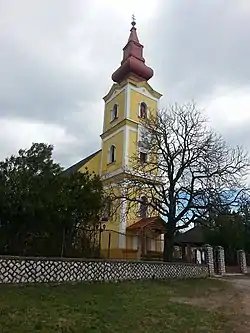
The Holy Spirit Church is a Greek Catholic church located in Sajópálfala, Hungary. It is called Szentlélek-templom in Hungarian. The very first church was built in 1717.
After the Turkish occupation and the Rákóczi's War of Independence, Rusyn people settled down in the area, and the first church was built up by Rusyns, which they made out of wood.[1]
In 1777, a mysterious event was recognised by local people. In the devotional picture, in which Virgin Mary and the Child are painted, bloody tears were rolling down on Mary's face on the surface of the painting. This supernatural event is one of the Marian apparations. The painting was delivered to Eger, but in 1973, the original painting was transported back to Sajópálfala.[2][3] Sajópálfala belongs to the destinations of The Way of Mary. It is a pilgrimage route, which connects Marian shrines. Other sights can be visited near Sajópálfala, for example, in Sajóvámos, Szirmabesenyő, Miskolc, Szikszó and Aszaló.
The previous wooden church was demolished, and in 1779 a church was constructed which can be still admired in the present. It is 26 metres high, more than 7 metres wide, and the walls are between 70 and 140 centimetres thick built of stone. At the end of the 19th century, the tower of the church was constructed which is approximately 30 metres high. In 1933, the very detailed stained glass of the church was created.[4]
Today there are three bells inside the church. At the beginning of the 1800s, a bell was made which measures about 400 kilograms. 22 years later a bell of 200 kilograms was made and finally, in 1861, a bell of half the weight of the previous one was constructed. Although in the middle of the 20th century the bell of 200 kilograms had to be taken because of military purposes, it was later substituted with a new one.[5][6]
References
- ↑ "Sajópálfalai görögkatolikus egyházközség honlapja". Sajopalfala-gorkat.borsodweb.hu. Retrieved 2017-04-30.
- ↑ "Sajópálfala". Bucsujaras.hu. Retrieved 2017-04-30.
- ↑ "300 éve könnyezett a sajópálfalai Mária-kép – Megkezdődött a tricentenáriumi emlékév | Magyar Kurír - katolikus hírportál". Magyarkurir.hu. Retrieved 2017-04-30.
- ↑ "Sajópálfala - könnyező kegykép". Mariaut.hu. 2012-11-28. Retrieved 2017-04-30.
- ↑ "Sajópálfalai görögkatolikus egyházközség honlapja". Sajopalfala-gorkat.borsodweb.hu. Retrieved 2017-04-30.
- ↑ Papp Faber, Erika. "Our Mother's Tears: Ten Weeping Madonnas in Historic Hungary", New Bedford. ISBN 1-60114-031-2.